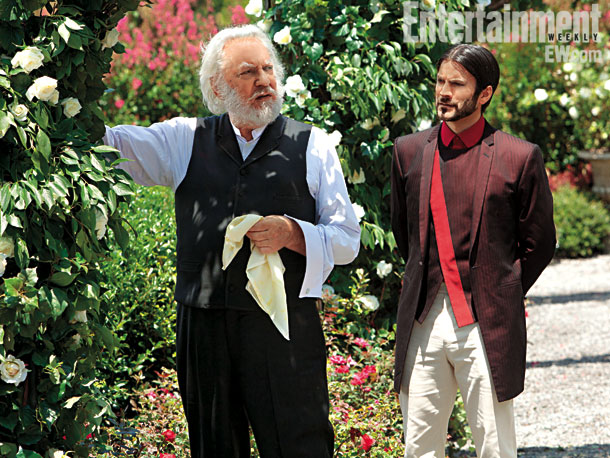Donald Sutherland is a towering figure in the world of film and television, a versatile actor whose career spans over six decades. Known for his distinctive voice, piercing gaze, and ability to bring depth to any character, Sutherland has left an indelible mark on the industry. This article explores his journey from a young aspiring actor to a celebrated icon of cinema and television.
Early Life and Beginnings
Donald McNichol Sutherland was born on July 17, 1935, in Saint John, New Brunswick, Canada. His father, Frederick, was a salesman, and his mother, Dorothy, a homemaker. From an early age, Sutherland showed an interest in the arts, particularly in acting. He attended Bridgewater High School in Nova Scotia and later enrolled at Victoria University, part of the University of Toronto, where he earned a degree in engineering and drama.
During his university years, Sutherland joined the University of Toronto’s Hart House Theatre and developed his acting skills. After graduating, he moved to London to study at the London Academy of Music and Dramatic Art (LAMDA), which further honed his craft.
Breakthrough and Rise to Fame
Sutherland’s early career involved a series of roles in British television and film, often playing secondary characters. His breakthrough came in 1967 with his role as Vernon Pinkley in the World War II film **“The Dirty Dozen.”** His performance caught the attention of both audiences and critics, marking the beginning of his rise to fame.
In 1970, Sutherland starred as Captain Benjamin Franklin “Hawkeye” Pierce in Robert Altman’s **“M*A*S*H.”** The dark comedy, set during the Korean War, was a critical and commercial success, and Sutherland’s portrayal of the rebellious surgeon became iconic. This role established him as a leading man in Hollywood.
Versatility in Roles
Throughout the 1970s and 1980s, Sutherland demonstrated his versatility by taking on a wide range of roles. He portrayed the chilling and manipulative fascist leader in **“1900”** (1976), the kind-hearted veterinarian in **“Fellini’s Casanova”** (1976), and the haunted father in the psychological thriller **“Don’t Look Now”** (1973).
Sutherland’s ability to switch between genres and characters was further showcased in **“Invasion of the Body Snatchers”** (1978), a science fiction horror film where he played a health inspector uncovering a sinister alien invasion. His performance added a unique layer of intensity to the film, solidifying his reputation as a versatile actor.
Acclaimed Performances and Recognition
Donald Sutherland continued to deliver compelling performances in the 1990s and 2000s. His role in Oliver Stone’s **“JFK”** (1991) as the mysterious Mr. X brought him critical acclaim, and he received a Golden Globe Award for his portrayal of the struggling writer in **“Citizen X”** (1995).
In 2003, Sutherland starred as the patriarch Nathaniel Fisher in the HBO series **“Six Feet Under.”** The show was a critical and commercial success, and his performance earned him an Emmy nomination. His ability to portray complex characters with depth and nuance was evident throughout the series.
One of Sutherland’s most memorable roles in recent years is President Coriolanus Snow in **“The Hunger Games”** series (2012-2015). His portrayal of the ruthless and calculating leader added a chilling dimension to the dystopian narrative, making him one of the standout characters in the franchise.
Awards and Honors
Despite his prolific career and numerous acclaimed performances, Sutherland has often been overlooked for major awards. However, his contributions to the industry have not gone unnoticed. In 2017, he received an Honorary Oscar for his extensive work in film, recognizing his influence and legacy in cinema.
Sutherland’s accolades also include multiple Golden Globe Awards, a Primetime Emmy Award, and a Canadian Screen Award. His ability to consistently deliver powerful performances across different genres and mediums has earned him respect and admiration from both peers and audiences.
Legacy and Influence
Donald Sutherland’s legacy in the entertainment industry is profound. He has worked with some of the most renowned directors and actors, bringing a unique presence to every role he takes on. His son, Kiefer Sutherland, has followed in his footsteps, becoming a successful actor in his own right, best known for his role in the television series **“24.”**
Sutherland’s influence extends beyond his immediate family. His commitment to his craft and ability to evolve with the changing landscape of film and television have inspired countless actors and filmmakers. His willingness to tackle diverse roles, from villains to heroes, in dramas, comedies, and thrillers, has set a standard for versatility and excellence.
Personal Life and Humanitarian Work
Outside of his acting career, Donald Sutherland is known for his humanitarian efforts and advocacy. He has been involved in various charitable organizations and causes, including education and the arts. His commitment to using his platform for positive change reflects his dedication to making a difference beyond the screen.
Sutherland has been married three times and has five children. His third and current wife, Francine Racette, is also an actress. The couple married in 1972 and have three sons together. Sutherland’s family life has often been a source of inspiration and grounding for him, providing balance amid his busy career.
Conclusion
Donald Sutherland’s career is a testament to his enduring talent, versatility, and dedication to his craft. From his early beginnings in Canada to becoming a celebrated figure in Hollywood, Sutherland has consistently delivered memorable performances that have captivated audiences worldwide. His contributions to film and television continue to inspire and entertain, solidifying his place as a legendary actor whose influence will be felt for generations to come.
As Sutherland continues to take on new roles and projects, his legacy in the entertainment industry remains as strong as ever. His ability to bring depth and authenticity to every character he portrays makes him a true icon of film and television, leaving an indelible mark on the world of acting.
